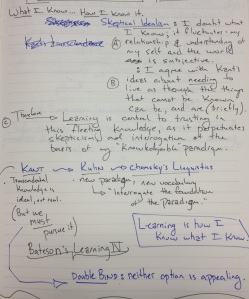About halfway through my attempted introduction of Philosophy 12’s Epistemology unit assignments – clumsily introduced here – Jonathan asked a salient question:
Could you do one of these assignments first, so we can see what it is you’re looking for?
To refresh myself ourselves, the individual piece of the Epistemology study will be to create a personal epistemological proposition: to state and explain something about what we know, and how we know it.
Can I do this first so I the class can see what it is I’m looking for?
Um… yeah, sure. Of course.
What I Know… How I Know It
This started out as a messy, painful process for me that I trust will emanate throughout the class this week. But this sort of psychic discomfort is integral to the learning process, I’ve come to think; and it is something that I was curious to lean into with the hope of seeing where my thinking took me.
I started with the attempt to create simple statements that I hoped would lead me somewhere meaningful.
Statement A
I doubt what I know; it fluctuates. My relationship and understanding of my self and the world is subjective.
Statement B
I read (some of) Kant’s “Critique of Pure Reason” to be about the need to live as though the things that cannot be known can be (even while admitting that they can’t).
Therefore (Statement C)
Learning is central to trusting in the fleeting knowledge gained while I interrogate and reform my “knowledgable paradigm.”
I have always been fond of the Hemingway quote:
There are some things which cannot be learned quickly and time, which is all we have, must be paid heavily for their acquiring. They are the very simplest things and because it takes a man’s life to know them the little new that each man gets from life is very costly and the only heritage he has to leave.
OK, so…?
Having come to some understanding of what I wanted to say, what I could stand behind as my beliefsabout knowledge at this stage, I then sought to ground these statements in the contexts of philosophy and epistemology. I had a few different ideas here, mostly due to recent thinking about Immanuel Kant, Thomas Kuhn, and Gregory Bateson.
Where to next?
As it stands now, I’m returning to the syllogistic A & B –> C format of attempting to lay out my proposition about knowledge and learning, trying to hone the statements offered above and support them with some of the thinking of other philosopher’s.
My “A” Statement at the moment begins with the preface of Kant’s Critique of Pure Reason:
“Human reason,” he says, “in one sphere of its cognition, is called upon to consider questions, which it cannot decline, as they are presented by its own nature, as they transcend every faculty of the mind.”
I’m hoping to contrast some of my thinking about the above with what he says later, that: “…a dogmatist promises to extend human knowledge beyond the limits of possible experience; while I humbly confess that this is completely beyond my power.”
Taken together (A & B), this rationale – to seek, even when the knowledge may be beyond us – creates a dizzying cumulative effect that Gardner Campbell spoke about a few weeks ago in Vancouver: the double bind. I think this scenario is where I find my thinking aligning with Gregory Bateson‘s Hierarchies of Learning, and even the ‘scientific crisis’ written about by Thomas Kuhn, wherein the old paradigm is the prison, but also the route to salvation (for a time).
Mr. Jackson, it seems like you’re more confused than when you started…
Of course not!
Well, maybe a little.
But I’ll let you know how the next few steps go.

